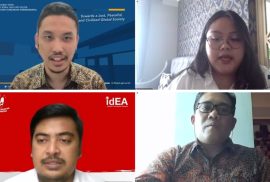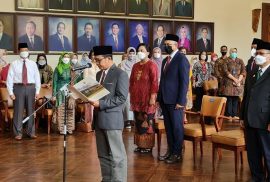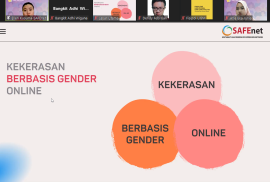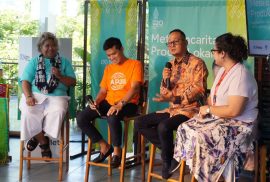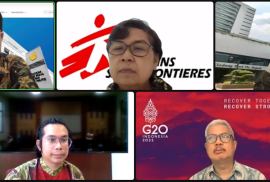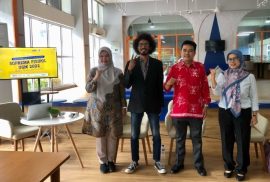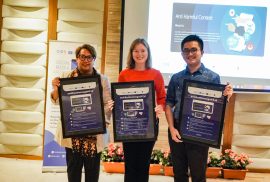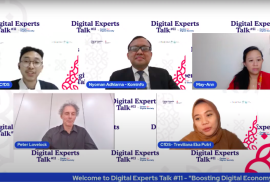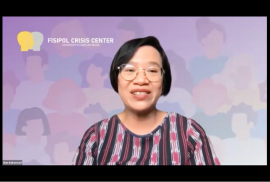Yogyakarta, July 29th 2022─In support of the series of activities “G20 Indonesian Presidency: Leadership for a Just and Sustainable World Order”, the Faculty of Social and Political Sciences (FISPOL) UGM held an online series of FGDs or Focus Group Discussions on Friday (29/7). This third FGD was moderated by Muhammad Irfan Ardhani, MIR (Lecturer of International Relations UGM) and raised the topic of discussion “Global Digital Transformation in the G20 Agenda: Towards an Inclusive and Sustainable Digital Economy Development”. FISIPOL UGM invited four speakers to discuss and provide recommendations regarding the problems in the global digital transformation agenda. The four speakers were the Coordinator of the IIS UGM Research Division, Nabilah Nur Abiyanti; Director of Digital Economy Ministry of Communication and Informatics, Dr. Ir. I Nyoman Adhiarna, M. Eng; Head of Public Policy and Government Relations in Indonesian E-Commerce Association/IdEA, Rofi Uddarojat; and a digital policy researcher, Wahyudi Djafar.
Yogyakarta, July 29th 2022─Dr. Arie Sudjito, S.Sos., M.Si. from the Department of Sociology, Faculty of Social and Political Sciences, UGM, was elected as the Vice-Rector for Student Affairs, Community Service and Alumni of Universitas Gadjah Mada for the 2022-2027 term of service. The inauguration of the Vice Chancellor was carried out in the Senate Hall of UGM Central Building by the Rector of the Gadjah Mada University, Prof. dr. Ova Emilia, M.Med., Ed., Sp.OG(K), Ph.D. on Friday (29/7).
Dr. Arie Sudjito is a Lecturer in the Department of Sociology of FISIPOL who teaches undergraduate (S1) and masters (S2) students. Some of the courses taught are Social Movements, 3rd World Poverty Problems, and Sociology of Agriculture and Villages for the Bachelor program and the Third World Industrialization course for the Masters program.
Yogyakarta, July 26th 2022—To celebrate the third anniversary of Health Promoting University (HPU) Fisipol UGM, Fisipol Crisis Center held a webinar titled “#GetSafeOnline : How to Prevent and Handle Online Harassment” on Tuesday (26/7). The webinar talked about preventing Online Gender Based Violence (OGBV) which stems from the fact that OGBV cases are rising in the digital era. Desintha Dwi Ariani, a lecturer in Fisipol UGM Sociology Department and Ellen Kusuma, the Head of Digital At-Risks SAFEnet Subdivision were the speakers.
Yogyakarta, July 21st 2022─The Center for Digital Society or CfDS UGM routinely holds Digital Expert Talks as a space to understand the latest digital issues related to the community directly from expert practitioners, industry, government, to well-known academics. On Thursday (21/7), UGM CfDS held the 13th Digital Expert Talk to discuss the challenges and efforts to improve cyber security in the implementation of the Electronic-Based Government System or SPBE. In the community, SPBE is widely known as e-government.
Labuan Bajo, July 21st 2022─The Center for Digital Society or CfDS UGM as a study center that focuses on digital technology issues has also enlivened the Digital Economy Working Group (DEWG) in the 2022 G20 Indonesia Presidency series. On Thursday (21/7), CfDS with the support of Meta, the Indonesian Ministry of Communication and Informatics, and the Association of Indonesian Internet Service Providers or APJII, held a discussion entitled “Meta Bacarita Local Products: MSMEs Empowered for Indonesia”. Specifically, the event, which was held live in Labuan Bajo and through the live broadcast of CfDS Instagram, discussed the acceleration of the digital economy through MSMEs by presenting perspectives from various backgrounds.
The Second Series of FISIPOL FGD Series Becomes a Space to Discuss Global Health Architecture Reform
Yogyakarta, July 15th 2022─The Faculty of Social and Political Sciences or FISIPOL UGM also enlivened the “Indonesia G-20 Presidency: Leadership for a Just and Sustainable World Order” by holding a FISIPOL Focus Group Discussion (FGD) Series. After successfully holding the first session to discuss the global work regime, the FISIPOL FGD Series is back with a second online session on Friday (15/7) in collaboration with the Institute of International Studies or IIS UGM. With the theme “Global Health Architecture Reform: Towards the Equitable and Just Health Governance”, the discussion was led by Dr. Muhammad Rum from HI FISIPOL UGM and invited three speakers with different backgrounds to discuss strategies and policies in advocating an equal and just global health architecture.
Yogyakarta, July 11th 2022─In its seventh year, Indonesia Young Sociopreneur or SOPREMA FISIPOL UGM is back with the theme “#7YearofSOPREMA: Recover Together, Recover Stronger, Rise up With Sociopreneur”. Youth Study Center (YouSure) Fisipol UGM held a press conference to open SOPREMA 2022 on Monday (11/7), in BRIWork Fisipol UGM. Yousure and Fisipol UGM always commit to create and support social entrepreneurship, especially among youths across Indonesia through the SOPREMA event (Sociopreneur Muda Indonesia).
Yogyakarta, June 28th 2022─Center for Digital Society UGM (CfDS UGM) in collaboration with UNESCO held a hybrid conference entitled ‘Addressing Gaps in Regulating Harmful Content Online’ on 28-29 June 2022. This event is part of the Social Media 4 Peace project funded by the European Union. Several expert speakers were presented in this event. Among them are Samuel Abrijani Pangerapan, Director General of ICT Application, MOCI; Faiz Rahman, researcher at CfDS UGM; Genoveva Alicia, researcher at the Institute for Criminal Justice Reform; and Noudhy Valdryno, Manager of Public Policy to Indonesia and Timor Leste from Meta. This event was moderated by Anisa Pratita Kirana Mantovani, researcher at CfDS UGM.
Yogyakarta, June 10th 2022─Center for Digital Society (CfDS) Fisipol UGM held Digital Experts Talk #11 with the title “Boosting Digital Economy in the Data-Driven Age” on Friday (10/6). The event, which took place via Zoom and broadcast live via YouTube Live, presented three speakers. Among them were Dr. I Nyoman Adhiarna (Head of DEWG Committee), Treviliana Eka Putri, (CfDS Researcher, UGM), and May-Ann Lim (Emeritus Director of Asia Cloud Computing Association), and Dr. Peter Lovelock (Principal, Fair Tech Institute, Access Partnership) as moderator.
Yogyakarta, June 10th 2022─Fisipol Crisis Center (FCC) Fisipol UGM held a Webinar Series #8 entitled “Adult Survivors of Child Sexual Abuse” on Friday (10/6). The event which took place on Zoom Meeting invited practitioners from the Pulih Foundation, Yosephine Dian Indraswari.
Pulih Foundation is a social institution that is engaged in handling trauma and psychosocial cases of violence and natural disasters that befell women and children. Based on data from the Pulih Foundation, sexual violence against children has increased during the pandemic. Previously, the most cases handled before the pandemic were domestic violence, sexual violence that afflicts adults, and dating violence.

